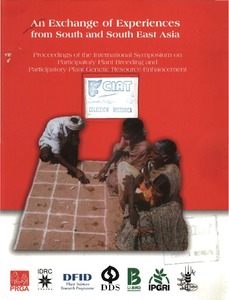Need for advocacy for effective participatory crop improvement and plant genetic resource enhancement: Case studies on rice-breeding processes from Khotang and JaJarkot Districts, Nepal
This paper deals with advocacy for effective participatory crop improvement and plant genetic resource enhancement. First, the need for advocacy is highlighted; second, cases on the community-managed process of managing plant genetic resources is discussed. Advocacy is public action directed towards wider social change. It is about changing the policies, practices, attitudes, positions or programs of governing institutions within the public and private sectors that have a negative impact in the age of globalization, multinational transnational corporations (MNCs TINCs) increasingly influence policies, but these organizations are not bound by rights-related laws and regulations. The trade-related intellectual property rights (TRIPs) agreement under the World Trade Organization (WTO) is a major threat to crop and variety development and genetic resource enhancement. Advancements in genetic engineering promoted by profit-oriented MNCs INCs is gradually taking over the classical research-and-development process. If we are concerned about participatory crop improvement, we have to pinpoint the issue now. We need to enforce favorable policies and effective implementation for the conservation of our genetic resources and participatory development of crops and varieties. Therefore, to have influence al the policy level, we have to develop links between operational work and advocacy. In this context, advocacy can support communities demanding their rights in germplasm conservations. It is about having an input when government is formulating relevant policies, considering the voice of the powerless in developing plant- breeding program or plans, and bringing about the realization of favorable promises or policies for the benefit of fanners. The case studies show that farmers have selected and maintained their rice crops for generations with their own experience. The role of women farmers vital to the process of seed selection, preservation, and maintenance. However, the cases indicate that men are still ignoring the role of women in the plant-breeding process. We argue that farmers are the owners of genetic resources, and they should have right to select, develop, conserve, and multiply them as they wish. Therefore, advocacy should be one of the major activities of all development organizations if they are to have any spillover effect for challenging sustained inequality and injustice lo farmers.

